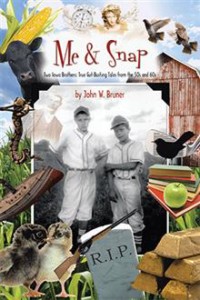Title: Me and Snap –– Two Iowa Brothers: True Gut-Busting Tales from the 50s and 60s
Author: John W. Bruner
Publisher: Xlibris
ISBN: 978-1-52454-925-1
Pages: 118
Genre: Memoir
Reviewed by: J.W. Bankston
Buy Book on Amazon
Pacific Book Review
Recently, a top ad agency admitted there was a problem with their campaigns. Too often, the commercials they had developed focused on aspirational images of city life –– tall skyscrapers, limos, pretty people in tailored clothing. In the future, the agency would develop more advertising focused on rural and small town settings. From the ad agency’s pledge to a politician’s mea culpa, this is a new perspective. Evidently people who don’t live in urban areas represent not just an ignored market but an untapped one. This could be good news for John W. Bruner’s memoir “Me and Snap –– Two Iowa Brothers: True Gut-Busting Tales from the ‘50s and ‘60s.” With its amusing chronicle of small town life, the book may well become a popular item. Perhaps it will provide inspiration for city dwellers considering a move to the country. It also serves as a remembrance, if not a memorial, for a bygone era.
I’m generally not nostalgic. I rarely listen to the music of my childhood and adolescence, nor do I pine for the era’s fashion. Most of my favorite tunes are recent releases and I prefer the styles of today to any other era since Fitzgerald defined “The Jazz Age.” Yet entering the world of “Snap” doesn’t feel like I’m listening to someone’s nostalgic recollections. It’s more like happening upon an episode of “The Andy Griffith Show.” That sitcom ran from 1960 to 1968, and few people would consider the U.S. of that period idyllic. Yet Bruner’s memoir is similarly serene. Set in the Postwar Era of the 1950s and 1960s, “Snap” is a place where the biggest threats to two young boys are spankings that never quite get delivered. When John and his slightly younger brother Snap play in the sewer, they don’t attract the attentions of a murderously malevolent clown. Instead, they have to get help to remove a chubby girl after she gets stuck. When the brothers are older, bar fights don’t end in stabbings. And if his second grade teacher is a bit smack-happy, well, there’s always the kindness of a loved one or another teacher to rely upon.
Reading “Me and Snap,” I was reminded of that famous line from “Field of Dreams.” After John Kinsella looks around and asks “Is this heaven?” his son Ray replies, “It’s Iowa.” The Iowan town of Carroll that Bruner depicts does seem just a step or two removed from a perfect afterlife. I had more than a few giggles with stories like “Kissin’ in the Chicken Coop” and “Books in the Britches.”
Even people who aren’t fans of rural living will be swept up by this author’s enthusiasm. After my own family abandoned Boston for rural Vermont while I was still in elementary school, my strongest feelings alternated between extreme boredom and extreme terror (wintery nights can be scary when you’re in an isolated cabin.) Bruner has a warmer perspective –– that of someone who never wanted to leave. The author’s stories are connected by neither chronology nor theme. They exist instead as vignettes, offering the reader the chance to dip in and out as they see fit. For this reason, they are the ideal escape from our often troubling world. This book would also make an excellent gift for both the curious and the nostalgic reader.


